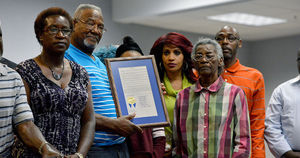Lake County officials said this week they remain disappointed that Gov. Rick Scott has not taken an interest in pushing for exoneration of the Groveland Four.
“The governor is not willing to deal with it and did not have the courage to meet in person,” said Groveland Mayor Tim Loucks. “I thought the governor had more compassion than he demonstrated.”
Lake County Commission Chairman Sean Parks also remained disappointed, but said the county will be persistent until we “restore honor for these families.”
A Florida Senate resolution asking for the men’s exoneration failed to pass this legislative session. But Lake County formally threw its weight behind an effort to exonerate the Groveland Four on March 15, issuing a proclamation calling the men’s rape convictions in 1949 a travesty and an injustice. Loucks read a similar proclamation at the city of Groveland’s council meeting on Feb. 16 and the city of Mascotte passed a similar proclamation on March 21.
Scott has been unavailable for meetings and has appointed someone from his staff to meet with officials. At those meetings in May those officials say the assistant counsel to Scott did not seem enthusiastic about exonerating Charles Lee, Walter Irvin, Samuel Shepherd and Ernest Thomas, four black men who were accused of raping Norma Padgett, a white woman, in 1949.
Loucks said Scott’s legal counsel simply mentioned in May it was a “lengthy and drawn-out process to exonerate the men, and he did not encourage it.”
Since then, it is not clear when or if exoneration will occur.
But members of the governor’s staff say Scott is simply following the clemency process and is reviewing any cases that are brought forward.
“We have received no application for the clemency process,” said Jeri Bustamante, spokeswoman for the governor.
Indeed, an application has yet to be filed on behalf of Lee, Irvin, Shepherd and Thomas, said Gilbert King, who wrote “Devil in the Grove,” a Pulitzer Prize-winning book on the Groveland Four.
The governor cannot pardon Greenlee, Irvin, Shepherd and Thomas on his own. It requires the approval of the governor and two members of the Executive Clemency Board. Clemency board members include Florida Attorney General Pam Bondi, Commissioner of Agriculture Adam Putnam and Chief Financial Officer Jeff Atwater. They are members of the Cabinet.
The Florida Commission on Offender Review is charged with conducting an investigation when a clemency application is brought forward. The commission then makes a recommendation to the Executive Clemency Board.
“The process is not very transparent based on the cases that I have been working on and it is difficult to get information on the case,” said Adam Tebrugge, staff attorney with the ACLU in Florida who has worked on a number of cases brought before the clemency board. “There are a lot of petitions that are pending. It is a matter of getting on the agenda.”
Tebrugge said the clemency board only meets four times a year.
“I am just speculating, but if the governor took an interest in that particular case it would have a much better chance of getting on the agenda,” he said.
Thomas fled Lake County the morning after the alleged rape, but was tracked down, shot and killed by members of a deputized posse, including then-Sheriff Willis McCall.
Greenlee, Irvin and Shepherd were beaten in the basement of the county jail. Despite the lack of physical evidence in the case, both Shepherd and Irvin were sentenced to death while Greenlee, a juvenile, was sentenced to life in prison.
King said a doctor, who was expected to testify in the case but who was not called by the prosecution, could not conclude that Padgett was raped.
Asked why Padgett accused two men who were not allegedly at the scene, King said: “In 1949 in the Jim Crow South, white juries were not looking for holes in the statements of white women who accused blacks of rape. Back then, juries implicitly trusted what the state attorney presented and what law enforcement testified to.”
King continued: “So it didn’t matter that the evidence might not exactly fit the prosecution’s theory. Juries, especially in explosive race/rape cases like this, did what the state attorney asked of them: to convict.”
Vivian Shepherd, the niece of Samuel Shepherd, said she was discouraged but would not give up.
“This was a wrongful injustice act and it needs to be made aware,” she said. “A lot of times there have been issues that have been covered and they don’t want to deal with it. All we are asking for is to clear their names. We have given proof that it did not happen. Just step up to the plate and do what needs to be done. We just want this injustice to be dealt with. Give us the closure we are looking for in this whole thing.”
King said he had hope the Groveland Four will eventually be posthumously pardoned.
“As Martin Luther King Jr. famously said, ‘The arc of the moral universe is long, but it bends toward justice.’”


